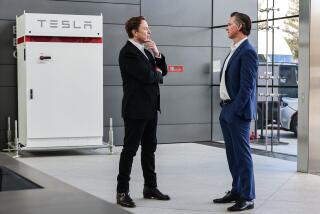Chips ‘n’ Bits to Go : At Fry’s Electronics, the bill of fare runs from transistors to Twinkies.
SUNNYVALE, Calif. — Make no mistake about it: Silicon Valley is very different from the rest of the world. You need only to visit Fry’s Electronics here in the heart of this high-tech mecca to confirm it.
Known to the locals as simply Fry’s, the store offers an array of consumer electronics--from boom boxes to big screen televisions--that rival the best of its competitors. But what distinguishes Fry’s from the pack of gadget emporiums is its selection of chips: both the kind you stick in computers and the salty, greasy kind you stick in your mouth.
“It’s ‘nerdvanna,’ one-stop shopping for nerds,” says Paul Saffo, a Silicon Valley think tank researcher who professes to study nerd culture on the side.
“They go in for a math co-processor and they pick up a six-pack of Coke and a couple of packages of Twinkies. Then they’re set!”
It all sounds simple enough. But are there really that many out-and-out “propeller heads”--even in Silicon Valley--to support Fry’s two giant computer paraphernalia, consumer electronics and junk food warehouses?
Probably not. But there are enough other regular consumers to fill the gap.
Silicon Valley insiders say Fry’s is trying to bring a high-volume, no-frills grocery store formula to consumer electronics and has positioned its store as a nerd heaven to distinguish itself from such formidable competitors as Circuit City.
Instills Confidence
In other words, the appeal to the computer aficionados is a marketing ploy, an attempt to generate trade in the otherwise sluggish and fiercely competitive electronics retailing arena.
“It’s like going into a Chinese restaurant and seeing it full of Asians. You know you’re in the right place,” says Steven Levy, a longtime Silicon Valley writer. “Same with Fry’s. You go in and see all these guys who haven’t seen the sun in six years and you instantly have more confidence.”
Indeed. Even the most casual visitor can easily see that Fry’s attracts a substantial number of non-techies, just ordinary folks who buy VCRs, stereo equipment, Nintendo games, fax machines and telephones.
No doubt many of these customers are attracted by the cut-rate prices. But clearly many are attracted by the decidedly offbeat ambiance. How else could you explain the aisle-by-aisle tour--soldering machines are across from shampoos and down a row from the Twinkies and Ding Dongs--that a middle-aged man was giving his elderly mother one recent day?
Store sales clerks say cash register receipts clearly indicate that ordinary consumer electronics items--not the $95 math co-processor chips or the 99-cent bags of Fritos--account for the largest percentage of sales.
Since opening their doors nearly five years ago, the four Fry’s founders have steadfastly rebuffed all media attempts to discuss their operation.
But inside their stores, employees speak readily about their bosses: Randy, John and David Fry and Kathy Kolder. According to these sources, the three Fry brothers are the sons of Charles Fry, who started a successful chain of supermarkets bearing his name in the San Francisco Bay Area more than 20 years ago. The brothers grew up in the grocery business, while Kolder brings experience from high-tech industry.
Silicon Valley analysts say the founders, who believe that they have created a retailing concept that can be reproduced elsewhere, are reluctant to discuss their operation for fear of inviting unwelcome competition. And they say the fear is hardly uncommon or unreasonable.
One analyst notes that Victor Alhadeff, founder of Egghead Discount Software, maintained a low profile as he built his retail chain, and suggests that Fry’s is considering branching out of the Silicon Valley into other communities with substantial concentrations of high-technology companies and, well, nerds.
The Los Angeles region, along with Boston, Dallas, Atlanta, Seattle and Ann Arbor, Mich., are said to be possible locations of future stores.
But focusing on computer freaks clearly has its disadvantages.
One recent day, for example, would-be software buyers couldn’t test the goods. An earlier customer had left a nettlesome, program-destroying virus on each of the floor model computers. “See what our customers do?” fumed a manager. “See what nice guys buy from us?”
More to Read
Inside the business of entertainment
The Wide Shot brings you news, analysis and insights on everything from streaming wars to production — and what it all means for the future.
You may occasionally receive promotional content from the Los Angeles Times.










